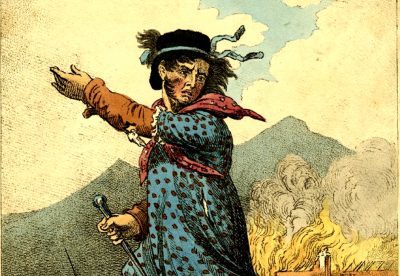The early nineteenth century brought drastic change to manufacturing. As the Industrial Revolution moved into full swing, factories and industries boomed and there was a sharp increase in jobs.1 Although many people in England were adapting to this industrial lifestyle, one group, known as the Luddites, showed resistance to the movement toward the mechanization of labor. The Luddites tried to resolve this by demolishing these modern machines, but ended up dispersing after government intervention.

Prior to the Industrial Revolution, the production of things was largely controlled by guilds. Guilds were organizations comprised of skilled artisans who dedicated their entire lives to craftsmanship. It took great learning, skills, and experience for guild members to manufacture their products. Because these people had to learn the entire process of crafting goods like textiles, it was a process that required years of training. The Shearers Guild, for example, which labored at the process of finishing pieces of woolen textiles, were among some of the most prestigious guilds in England in the late eighteenth and early nineteenth centuries.2

When the Industrial Revolution took off, there were startling contrasts between the work of guilds and the kind of work taking place in the factories. Unlike guilds, factory owners hired unskilled and inexperienced people, commonly children and women, and had them attending to hazardous machines for long periods of time. As opposed to a single guild member working on the entire process of textile making, often with years of experience in such production, a factory worker merely attended to the needs of his or her machine, changing empty bobbins of thread or making sure the machine had plenty of raw cotton for its work. The rhythm of work within the guilds tended to be flexible and free in comparison with factory work. Factory workers, on the other hand, faced overwhelming numbers of rules, and were constantly monitored.3
Among those affected by the rise of factories were the guild workers, who saw factory labor as unacceptable. Various guilds protested in various regions. Guild workers living in the Midlands counties such as Nottinghamshire, Derbyshire, and Leicestershire, worked in crafts of lace making and framework-knitting. Those residing in Yorkshire tended to be woolen guild workers. Finally, those who lived around Manchester were members of the cotton weavers guild. In 1811, these guilds started to take matters into their own hands against the production of factory-made products by unskilled workers. These protesters began in the Nottinghamshire village of Arnold. They were from the framework-knitters guild, and they broke into shops in order to take away jack wires that were essential to wide knitting frames. The following month, the frames themselves were destroyed by the protesters, now calling themselves Luddites. Several factors that led to the protests involved the restriction of looms that a weaver could own, as well as the creation of “cheap shoddy material” from the wide stocking frames. Other protester began calling themselves Luddites as well, such as the cloth dressers in Yorkshire called croppers. Traditionally, the croppers used a fifty-pound handheld shear to cut the nap from woven woolen cloth. With the introduction of the gig mill, the croppers felt outdated and “threatened.” The gig mill had the ability to shear woolen cloth easier with little to no experience required. And so, in 1812, the Luddites smashed the equipment in the town shops and mills of Yorkshire. It should be noted that Luddites also took part in food rioting and advocating for political reformation.4
It made the Luddites furious to see society abandoning their old traditions in favor of quick and dirty methods of production. Disguising themselves, they initially started to demolish the textile machinery, blaming that machinery as the sole reason for the radical change of their entire way of life. They often attacked in the middle of the night, making sure that they only harmed machines. Their attacks would be reminiscent of modern-day environmental activists who sabotage construction equipment. The Luddites claimed to have a leader named Ned Ludd, otherwise known as King Ludd. But who exactly was this king? He was a supposed leader who may or may not have ever existed. Historians have long debated whether King Ludd was a real person or some imaginary figure made up by the Luddites.5 Whether or not Ned Ludd existed, the Luddites saw him as a figurehead.

The Luddite attacks originated in Nottingham, England, but they steadily spread to other surrounding cities. As a result, the British government hired people to help protect the mill owner’s machinery. Things escalated in 1812 when a fight broke out between the Luddites and the guards, in which several Luddites were killed.6 Following the Luddites’ failed attempt to attack Rawfolds Mill, which resulted with the owner getting killed, the Luddite movement started to grow weak.7 Eventually, the government had to hang fourteen Luddites in 1813 to set an example to anyone else who might have considered rebelling. After that, any form of resistance from the Luddites stopped.8
As the Industrial Revolution grew exponentially, and factory labor prevailed, the way of life of the guilds gradually died out. With the introduction of mechanized production by machinery, cheap, unskilled labor came to dominate the production process in most industries. With state-of-the-art technology, who would want to go back to the slow, difficult process of production that the guilds had embraced? Ever since the British government’s intervention on behalf of the machine owners, the term Luddite has become a term of derision for those who would be ignorant obstructers of progress.
- Jerry Bentley, Traditions & Encounters A Brief Global History Volume 2 (New York: McGraw-Hill Education, 2016), 496-497. ↵
- Jerry Bentley, Traditions & Encounters A Brief Global History Volume 2 (New York: McGraw-Hill Education, 2016), 496-497. ↵
- Jerry Bentley, Traditions & Encounters A Brief Global History Volume 2 (New York: McGraw-Hill Education, 2016), 496-497. ↵
- International Encyclopedia of the Social Sciences, 2008, s.v. “Luddites,” edited by William A. Darity. ↵
- The Greenhaven Encyclopedia of Terrorism, 2007, s.v. “Luddites,” by Patricia D. Netzley. ↵
- The Greenhaven Encyclopedia of Terrorism, 2007, s.v. “Luddites,” by Patricia D. Netzley. ↵
- International Encyclopedia of the Social Sciences, 2008, s.v. “Luddites,” edited by William A. Darity. ↵
- Jerry Bentley, Traditions & Encounters A Brief Global History Volume 2 (New York: McGraw-Hill Education, 2016), 496-497. ↵



63 comments
Caroline Bush
Interesting article! I never really knew the story of Luddites during the Industrial Revolution so this article was very interesting. I really enjoyed the amount of details in this article and can tell it was very well researched. Its interesting how the protestors were able to see the injustice being done to them by the factory owners. I really enjoyed the amount of details in this article and can tell it was very well researched. Overall this was a very interesting article and I enjoyed reading it.
Hector Garcia
The story of the Luddites during the Industrial Revolution was pretty interesting. These protestors were able to see the injustice that was being done by factory owners and they decided that had had enough. This comes to show one of the many negative repercussions that came about thanks to the Industrial Revolution. It was also interesting for the author to include the modern term of Luddite in his article.
Constancia Tijerina
The Industrial Revolution was a time of completely new era of scary new shiny things and inventions. Being in this day and age, i myself, would have been very skeptical of the of inventing things or crafting material with the help of machines doing a lousy job. If i were to choose a side i would classify myself as one of the Luddites with their ideas of true craftsman ship and hard work; not to have some children do the work of what takes years of practice and women who finally have the chance to go out into the work force without any way of having experience rather than what they know and learned at home. However, this was the revolution that helped create a stronger future to all countries later on in history which basically makes the Luddites scared of change. Over all, this article was great to read and very intriguing for all readers!
Maria Esquivel
The luddites were so used to doing things a certain way and then they were no longer the main source of production, therefore, I can understand why they were so angry about modern machines. I don’t agree with the way the luddites destroyed the equipment but that shouldn’t have been a reason for the government to kill some luddites. Overall, I really enjoyed reading how the industrial revolution impacted the guild production. Great article!
Fumei P.
The industrial revolution changed everyone’s lives. The Luddites were no exception, guilds became obsolete and skills that took years of experience to master were no longer necessary, because machines could produce the same results in no time, at no extra cost. Women and children with no skills would also earn less wages and work longer hours than guild members. Although goods were produced at exponential rates, factories would use cheap materials, which angered the Luddites even more because they prided themselves on quality craftsmanship.
Tyler Sleeter
Great article. I have to admit I read this article only because my mom calls herself a Luddite since technology hates her. I liked your article because it explained the background of the Luddites in good detail. I did not realize that the industrialization of jobs led to the downfall of the guild system although it makes perfect sense that it happened. It is easy to see why some people did not like the machines since it put them out of work and forced them to adapt to the modern way or fail. It seems to me that even if the Luddites had been successful in England, they could not have stopped the industrial revolution, somethings just have to happen.
Cristian Medina-Lopez
This to me seemed like something that could and has been repeated many times throughout history. When something new that makes things easier, faster and more efficient, it will replace it and that’s what happened with the Luddites for not wanting to change their ways. Altogether, I enjoyed this article and it was enjoyable to expand my knowledge on this subject.
Carlos Aparicio
Before this article, I hardly knew anything about the industrial revolution. As I read this interesting article, I found out many interesting facts. I had never heard of the Luddites or what there mission was. I can see why they were very angry with the machinery back then because it was obviously taking their jobs away after dedicating their lives to it. I honestly feel for them because of all their hardworking commitment. On the other hand, in todays society there is a need for this machinery today for how advanced the 21th century is. Very informative article with amazing detail.
Mark Martinez
A well written and put together article. I can’t imagine being a guild worker hearing out a new industrialized machine doing my job. A quicker and cheaper version of my job. Having dedicated a lifetime to learn a craft just to become obsolete. Everyone loves hand made objects but its expensive and takes time. Its just sad how the guilds gradually faded away.
Alexis Soto
As a fan of the role-playing genre in video games I am familiar with the term guilds and their function. Reading about the death and way of life of guilds in this article was a bit saddening. Their way of life being challenged by the new culture set by the industrial revolution. I am not surprised they protested the industrial age to survive. Ultimately, the guilds lost the war, and now they are just a part of history.